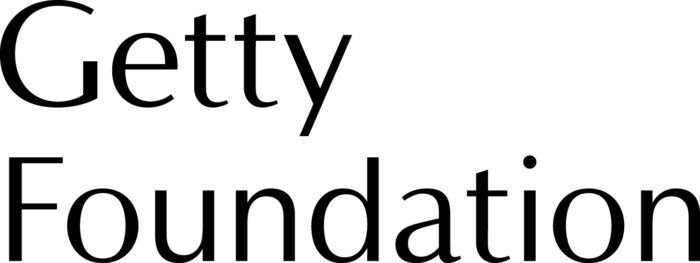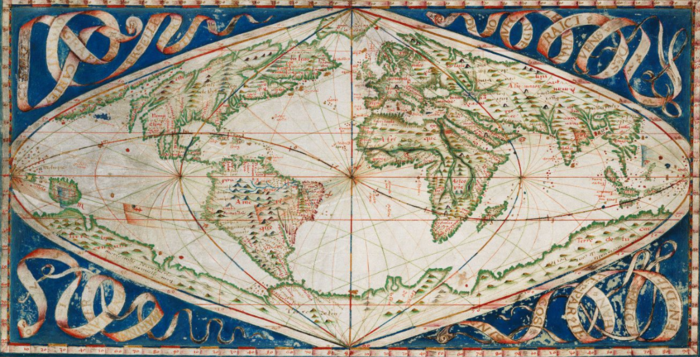Research Seminars on Periodization in the History of Art
Research ProgramsPeriodization in the History of Art and its Conundrums. How to tackle them in East-Central Europe
Periodization in the History of Art and its Conundrums. How to tackle them in East-Central Europe
A program supported by the Getty Foundation as part of its Connecting Art Histories initiative

Timeframe:
2018 – 2021/ 2022
Coordinator:
Anca OROVEANU, PhD, Academic Coordinator of the New Europe College-Institute for Advanced Study, Bucharest; Professor of History and Theory of Art at the National University of Arts in Bucharest
Periodization in the History of Art and its Conundrums. How to tackle them in East-Central Europe
Participants:
16 early career scholars from East-Central Europe
Natalya ANTONOVA, PhD Candidate in Comparative Gender Studies, Central European University, Vienna, Austria
Nikita BALAGUROV, PhD Candidate in Cultural History of Central and Eastern Europe, Lund University; ABD in History, National Research University Higher School of Economics, Saint Petersburg
Mădălina BRAŞOVEANU, Assistant Professor, Faculty of Visual Arts, University of Oradea; PhD in Art History, National University of Arts Bucharest
Alexandra CHIRIAC, Leonard A. Lauder Fellow in Modern Art 2020-22, The Metropolitan Museum of Art, New York; PhD in Art History, University of St Andrews
Kirill CHUNIKHIN, Associate Professor, Department of History, National Research University Higher School of Economics, St Petersburg; PhD in Art History, Jacobs University, Bremen, Germany
Barbara DUDÁS, Assistant Research Fellow, Institute of Art History, HAS Research Center for the Humanities, Budapest; PhD Candidate, Academy of Fine Arts, Vienna
Nora GOLESHEVSKA, Independent Scholar; Research Coordinator – Art Project Depot Association; PhD in Philosophy, Faculty of Philosophy, “St. Kliment Ohridski” University of Sofia
Dora MÉRAI, Postdoctoral Fellow CEU, Department of Medieval Studies; PhD in Medieval Studies, CEU
Cosmin MINEA, Postdoctoral Fellow, Chair for the History and Theory of Architecture Prof. Dr. Maarten Delbeke, ETH Zürich; PhD in Art History, University of Birmingham
Cristina MORARU, Assistant Professor, George Enescu National University of the Arts, Iaşi; PhD in Critical Theory, Faculty of Philosophy and Social Political Sciences, Alexandru Ioan Cuza University, Iaşi
Ancuţa MORTU, Scientific Researcher, Member of the MASH Junior Research Group ‘Remote Access: Understanding Art from the Distant Past’, Faculty of Arts – Masaryk University, Department of Art History, Brno, Czech Republic; PhD in Aesthetics, EHESS, Paris
Giorgi PAPASHVILI, Researcher and Projects Coordinator at George Chubinashvili National Research Centre for Georgian Art History and Heritage Preservation; PhD Candidate, Apollon Kutateladze Tbilisi State Academy of Art, Faculty of Restoration, Art History and Theory
Radek PRZEDPEŁSKI, Adjunct Teaching Fellow, Trinity College Dublin; PhD in Digital Arts and Humanities, Trinity College Dublin
Julia SECKLEHNER, Postdoctoral Research Fellow, University of Birmingham; PhD in Art History, The Courtauld Institute of Art, London
Zsuzsa SIDÓ, PhD Candidate CEU
Andreea ŞTEFAN, Curator, National History Museum of Romania; PhD in Classical Philology, University of Bucharest
Consultants:
Edit ANDRÁS, PhD, Senior Research Fellow at the Institute of Art History, Centre for the Humanities of the Hungarian Academy of Sciences, Budapest, Hungary; Visiting Professor at the History Department, CEU
Ruxandra DEMETRESCU, PhD, Professor of History and Theory of Art, Head of the Doctoral School, National University of Arts, Bucharest, Romania
Emil Cristian NAE, PhD, Associate Professor in the Department of Art History and Theory, Faculty of Visual Arts, George Enescu National University of Arts, Iași, Romania
Bojana PEJIĆ, PhD, Curator, Independent Art Historian and Lecturer based in Berlin
Mara RAȚIU, PhD, Assoc. Prof., Vice-Rector for Institutional Partnerships, University of Art and Design in Cluj-Napoca, Romania

This program consists of a series of three research seminars of one-week duration each, discussing periodization and related issues in the history of art, whose addressees are early-career art historians from East-Central Europe, and which include a number of invited guest speakers, from this region, and outside it. Though a sense that the conventional periodizations are in need of revision can be detected earlier, a more pointed reflection on this topic can be noticed after the demise of communism and the dismantling of the colonial system. In the aftermath of the 1989 events in the countries of Central and Eastern Europe, a number of scholars felt the pressing need to reconsider the place of local art histories within the established narratives, and to reflect on how these local histories might fit within the Western canon, or to question its authority. Art historians dealing with modern and contemporary art were particularly sensitive to such questions, but this gradually became a more general concern, affecting the writing of histories of art of earlier periods. Frictions between the generally accepted periodizations and local trajectories in art became more apparent, making it necessary to reflect on approaches that could address such concerns, and on the instruments art historians may put to use in order to tackle particular case studies. It thus seems to us that periodization, with the many issues related to it, is a topic likely to elicit interest from colleagues and younger scholars from countries in the region, and to lead to fruitful exchanges not just across the discipline, but across national borders, and – through the presence of the invited speakers – across regional ones.
This series of seminars aims to address questions that are (or so we deem) of interest to art historians in the countries of East-Central Europe in ways that would counter a piece-meal approach, mostly dictated by national borders, in favor of a more unified one, and would provide an opportunity to identify common concerns, and possibly case studies that could (or should) encourage cross-border collaboration. It hopes to contribute in this manner to a better communication between art historians in this region.
Structure and content
The Program consists of a series of three one-week seminars with the participation of 16 early career scholars from East-Central Europe, up to 4 keynote/guest speakers per seminars, the Coordinator and the Consultants. Each seminar will have three main components:
- Talks delivered by keynote/guest speakers, followed by discussions
- Discussions taking as a starting point key texts relevant for the topics approached in the seminars
- Presentations of works in progress/case studies by the addressees of the Program, that is, early career scholars from East-Central Europe, and discussions on them with colleagues, guest speakers, coordinator and consultants
Dates
Third seminar: June 16 – 23, 2022
*Originally scheduled for May 2020, this third (and final) seminar in the series had to be postponed due to the pandemic. In the interval we have scheduled a webinar, as a means for the members of the team to keep in touch.
Second seminar: November 25 – December 3, 2019
First seminar: May 6 – 14, 2019
Guest speakers
Third seminar:
Mieke BAL, Professor of Theory of Literature and founding director of the Amsterdam School for Cultural Analysis (ASCA), University of Amsterdam
Andrea GIUNTA, Principal Researcher at CONICET, Argentina, Professor of art history at the Universidad de Buenos Aires, Curator Bienal 12, Porto Alegre, 2020
Christopher WOOD, Professor and Chair, Department of German, New York University (Affiliated Faculty, Department of Comparative Literature and Institute of Fine Arts)
Magdalena RADOMSKA, Assistant Professor, Art History Institute, Adam Mickiewicz University, Founder and Head of the Piotr Piotrowski Center for Research on East-Central European Art
The public talks will take place at the NEC (though some of them online), but the audience is kindly asked to rather resort to the Zoom transmission since our conference hall cannot accommodate more people than the ones engaged in the seminar.
Recurrent link for all the public talks:
https://us02web.zoom.us/j/82640541798?pwd=SC85MzhyWnNjZk1reTg1N0h4T2M4dz09
Meeting ID: 826 4054 1798
Passcode: 414844
Second seminar:
Thomas DACOSTA KAUFMANN, Frederick Marquand Professor of Art and Archaeology, Princeton University
Matthew RAMPLEY, Professor, Department of Art History, Masaryk University, Brno, ERC Principal Investigator | Continuity / Rupture: Art and Architecture in Central Europe 1918-1939
Katarzyna MURAWSKA-MUTHESIUS, Professor of Art History at Birkbeck College, University of London
Carmen POPESCU, Professor of Architectural History at the Ecole Nationale Supérieure d’Architecture de Bretagne (Rennes)
First seminar:
Patrick FLORES, Professor of Art Studies at the Department of Art Studies at the University of the Philippines, Curator of the Vargas Museum in Manila, and Adjunct Curator at the National Art Gallery, Singapore
Krista KODRES, Professor at the Institute of Art History and Visual Culture of the Estonian Academy of Arts, Tallinn, and head of the doctoral curriculum in art history
Saloni MATHUR, Professor, Modern And Contemporary South Asian Art, Department of Art History, UCLA
*
Extension of the program during the academic year 2022-23
Since the onset of the war in Ukraine we have been extremely concerned by the fate of our fellows and alumni who might be – and have been – exposed to it. We tried to intervene, be it with modest means, whenever and wherever we could. The extension granted to us by the Getty Foundation is a continuation of these small initiatives we could implement so far by using our own small resources. During the academic year 2022-23 we are inviting some among the scholars from Ukraine, Russia or Belarus, already connected with NEC, primarily through the Periodization seminar series, who find themselves in difficult circumstances as a result of the war, by offering them the position of NEC Fellows, by integrating them in the life of the College, and by covering some of the expenses entailed by their stay in Bucharest as our guests.
Anna ADASHINSKAYA, Fellow, Extension of the Periodization in the History of Art research program